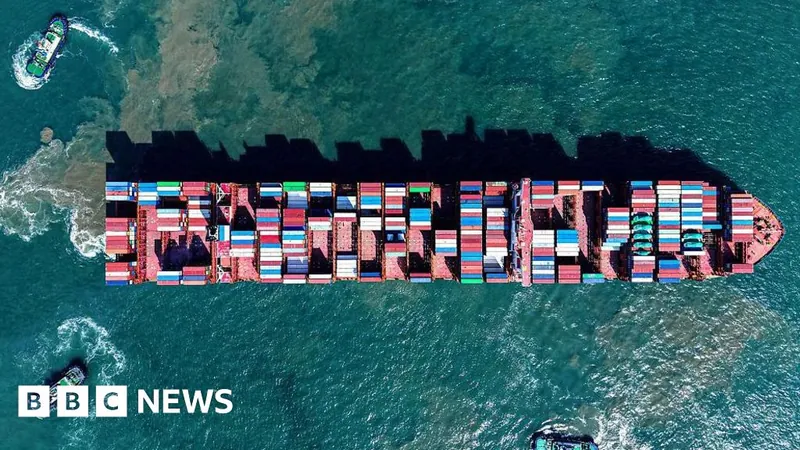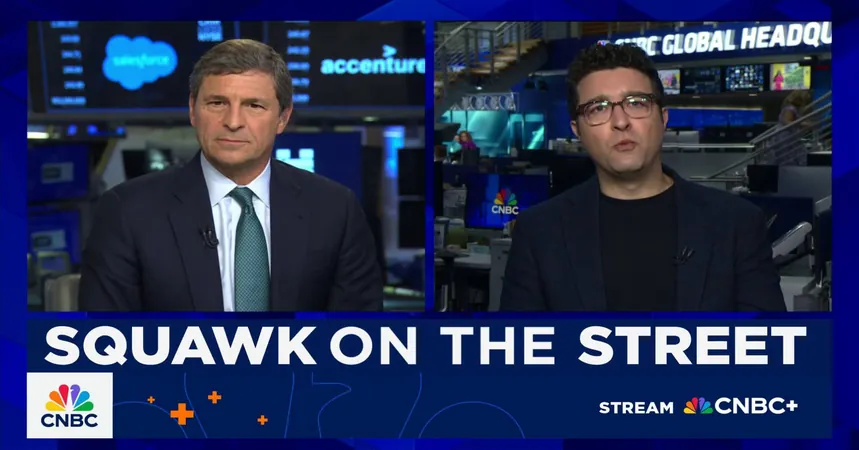
The Alarming Rise of Cyber Attacks on Global Shipping Firms
2025-09-14
Author: Charlotte
Why Hackers Are Zeroing In On the Shipping Industry
In a digital age, the world’s shipping sector stands on the frontline of a rising wave of cybercrime. As global trade increasingly hinges on maritime transport—carrying around 80% of all goods—hackers have turned their sights on this crucial industry, orchestrating attacks that disrupt operations and drain resources.
Nigerian Gangs: The Major Players in Shipping Cyber Crime
Lawyer Henry Clack from London’s HFW law firm reports a troubling trend: Nigerian organized criminal groups are among the chief culprits behind cyber attacks in shipping. These gangs have been particularly notorious for executing sophisticated 'man-in-the-middle' frauds—where hackers intercept communications to impersonate parties and steal sensitive data or financial information.
Escalating Costs of Cyber Attacks
The financial toll on the shipping industry is staggering. HFW reports that from 2022 to 2023, the cost of managing cyber attacks surged to an average of $550,000, while ransom payments have skyrocketed to an average of $3.2 million, underlining the severity of the crisis. With interruptions not only straining budgets but also capacity for shipping firms, the implications are dire.
A Diverse Set of Threats
John Stawpert from the International Chamber of Shipping highlights that the scale of the problem is further compounded by threats not just from criminal gangs but also from state actors, notably Russia, China, North Korea, and Iran. These nations are suspected to be behind targeted attacks often aimed at disrupting crucial logistical operations.
Explosion in Attack Incidents
Recent statistics reveal a startling surge in cyber attacks on shipping, with incidents skyrocketing from a mere 10 in 2021 to at least 64 last year. This alarming increase is partly due to the growing interconnectedness of shipping operations facilitated by new technologies.
The Digital Age: A Double-Edged Sword
While advancements like Elon Musk’s Starlink satellite service enhance maritime communication, they simultaneously create fresh avenues for hackers. A notable example of mismanagement occurred when a U.S. Navy chief was relieved of duty for improperly installing a satellite dish on a vessel, exposing systems to potential threats.
Risks Beyond Ransomware
Cyber threats extend beyond mere financial gain; GPS jamming and spoofing pose substantial risks as well. Such attacks can reroute ships into perilous waters, as evidenced by the MSC Antonia container ship running aground following a suspected GPS spoofing incident.
Steps Toward Security Improvements
The good news? The industry is responding to these growing threats with enhanced security measures. Following recent mandates from the International Maritime Organization, shipping firms must now embed strict cyber risk management practices into their operations, significantly tightening security protocols.
A Cyber-Aware Future
Experts like Stawpert suggest that, compared to just a few years ago, the shipping sector is better equipped to tackle these cyber threats. A heightened awareness of cyber crime is proliferating through the industry, leading to improved defenses and strategies.
The Art of Negotiation with Criminals
When faced with hacking incidents, how do firms like HFW engage with these criminal entities? Clack reveals that communication during ransom negotiations is kept to a minimum, often limited to brief electronic messages to ensure safety and prevent escalation.









 Brasil (PT)
Brasil (PT)
 Canada (EN)
Canada (EN)
 Chile (ES)
Chile (ES)
 Česko (CS)
Česko (CS)
 대한민국 (KO)
대한민국 (KO)
 España (ES)
España (ES)
 France (FR)
France (FR)
 Hong Kong (EN)
Hong Kong (EN)
 Italia (IT)
Italia (IT)
 日本 (JA)
日本 (JA)
 Magyarország (HU)
Magyarország (HU)
 Norge (NO)
Norge (NO)
 Polska (PL)
Polska (PL)
 Schweiz (DE)
Schweiz (DE)
 Singapore (EN)
Singapore (EN)
 Sverige (SV)
Sverige (SV)
 Suomi (FI)
Suomi (FI)
 Türkiye (TR)
Türkiye (TR)
 الإمارات العربية المتحدة (AR)
الإمارات العربية المتحدة (AR)